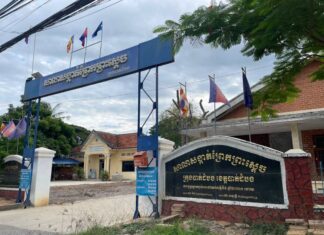University education in Cambodia is suffering because many students need to work full-time to support their living, students and university staff said.
Reporters interviewed several students this month who work full-time while studying at universities in Phnom Penh. They all expressed their feelings of concern, saying it was a struggle to keep up with their studies at the same as working several hours every day.
Leang Leakhena, 20, studies dentistry at the University of Health and works full-time as a dentist’s assistant. She has experienced many consequences from trying to do both at the same time because work and school takes up a lot of time, Leakhena said.
“I am working full-time in Phnom Penh and when I leave from the workplace, it’s tiring and I can only go to school irregularly because on some days [my] workplace has many things to do or is very busy,” she said.
Kuy Nary, a 21-year-old marketing student at the Preah Kossomak Polytechnic Institute, works at the University of Cambodia’s Honda library full-time. She said she was always feeling tired, and because of her work she could not try her best in her studies.
“[With both] studying and working, [I] do not have enough time to study. We know that for many workplaces it is not easy to do,” she said.
Two students at the University of Cambodia also agreed that it is difficult to work and study at the same time.
Fourth-year international relations student Yet Yin, 26, said he works full-time as a quality and assurance leader in a clothing factory and studies in the evening. He faces many challenges and said sometimes he cannot attend school or focus on his lessons.
“When I return from [my] workplace, [I’m] so tired and can’t focus 100 percent on the lesson. Also, during busy seasons at work and school, it puts a lot of pressure on me,” he said.
Chhun Sreykunsocheata, a third-year student in business management, has worked full-time as a seller at flower shop Capi Cambodia since finishing high school. She said her workplace is very far from her house and school, and causes her to be always late to school.
“It feels like a lot of pressure, especially when we do assignments. Sometimes [when I] have to help with teamwork, because [I’m] busy, I can’t help my team,” she said.
At Pannasastra University, Eom Sreyne, 19, who is studying English teaching, said she works as a teacher’s assistant from 7:10 a.m. to 12:30 p.m. in the mornings and afternoons from 12:30 to 5:00 p.m. She then studies at Pannasastra from 5:30 to 8:30 p.m.
“I am working because I need money to support my studies, and I do not want to depend on my parents. I also face problems with my studying because when I worry about my work, I can’t focus on my studies and sometimes I am so tired after working,” she said.
Hok Ly, a lecturer who teaches public policy at the University of Cambodia, agreed with the students that working full-time can affect how well they do in class.
“For students whose workload [continues] until overtime, when they enter the classroom they feel sleepy and tired and can’t capture the lesson,” he said.
However, for third-year students, it is good practice to work and study at the same time to gain experience, Ly said.
Chen Veun, director of the scholarships and grant loans office at Pannasastra University, said the situation causes many students to be unable to graduate within four years, and also impacts their grades.
“Most of them extend their study period. They are supposed to study only four years, but most of them finish their studies in six years,” he said. “Based on their study records, they get very low grades. Sometimes, they are required to repeat their failed courses.”
However, students who work full-time can reduce their course load to better focus on getting good grades, even if it takes more years to graduate, he said.
“By focusing on quality and the results of their study, without being concerned about the study period, students still have been able to get good grades even while working full-time,” Veun said. “For example at PUC, students can enroll in fewer courses than required for one term or semester.”
Nevertheless, Veun said he still recommends that students only start working in their third year.
Ros Soveacha, a Ministry of Education spokesman, said that according to the law, students can choose their course of study and their jobs as necessary to fulfill their needs.
“A citizen has the right to select the ways of studying and jobs legally for achieving a high quality of life. It is also a way to develop the society, culture and economy,” Soveacha said, explaining that it was up to individuals to find the right balance.
“A citizen can measure the positive results against the impact from working while studying at the same time,” he said.












